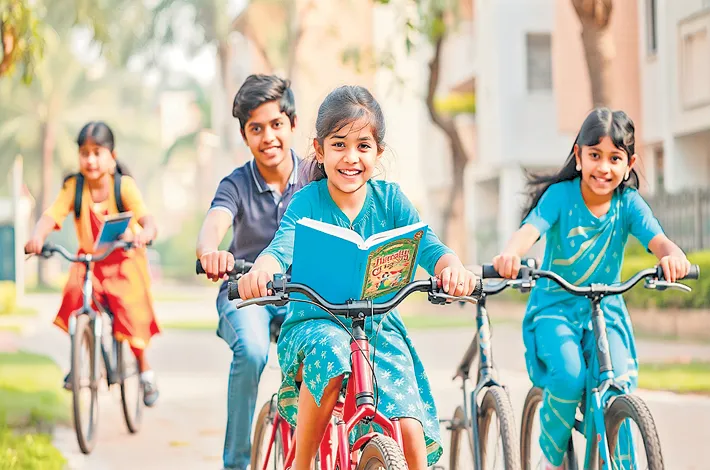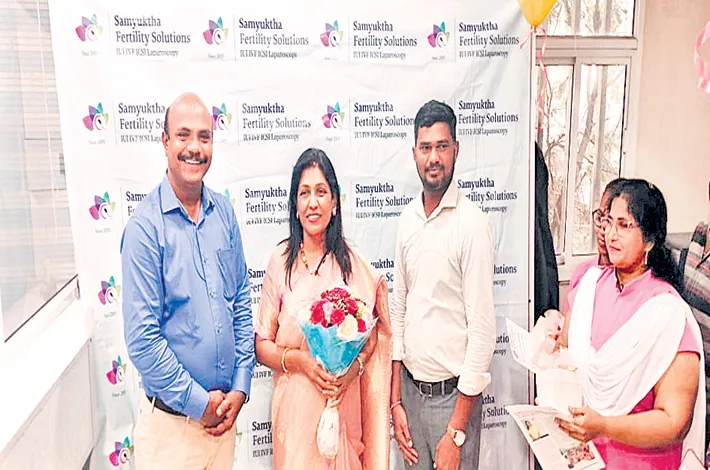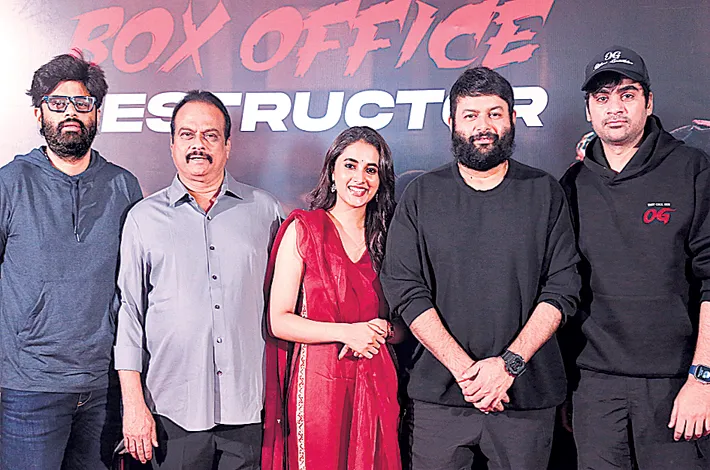The Library on the Lawn
18-09-2025 12:00:00 AM

In the bustling city of Hyderabad, tucked within the vibrant Sunshine Meadows gated community, children raced around on bicycles, their laughter mingling with the scent of jasmine. But for eleven-year-old Maya, her younger sister Diya, and their friends Samir and Leela, something was missing. They enjoyed their tablets, alive with games and e-stories, but they longed for the magic of physical books—the crinkle of pages, the inky smell, the weight of a story in their hands. They dreamed of a library right in their community, a haven for real books.
The idea bloomed one sticky afternoon as the four friends lounged on the grassy play area, a sprawling lawn dotted with swings and slides. Maya, the group’s spirited leader, held an old copy of The Jungle Book her grandmother had gifted her. “This book feels like an adventure itself,” she said, tracing the faded cover. “Why don’t we have a library here? A place for books we can touch and share.”
Diya’s eyes sparkled. “We could build it in that empty corner by the slide! Nobody plays there.”
Samir, ever the realist, scrunched his nose. “The elders won’t agree. They’ll say it’s too costly or takes up space.”
Leela, the group’s dreamer, twirled her braid. “Then we’ll convince them! We’ll show how much we need it.”
The friends devised a plan. They had one week until the next Sunshine Meadows Residents’ Association meeting, where the community’s elders decided on such matters. They needed to be ready.
First, they polled their friends. Maya and Samir knocked on doors, asking other kids what they thought of a library. “I want mystery books!” said one. “I’d read animal stories!” said another. Diya and Leela tallied the responses, finding 25 children—nearly every kid in the community—excited for a library.
Next, they planned the details. The empty corner by the banyan tree was perfect: shaded, quiet, and unused. Diya sketched a cozy wooden library with shelves, a colorful rug for storytime, and benches for reading. Samir, who loved math, dug through his father’s carpentry catalog to estimate costs. “A simple structure won’t cost much,” he said. “We can ask for book donations to stock it.”
Leela suggested making it eco-friendly. “Recycled wood and solar lights for night reading!” she said. The others agreed—this would appeal to the elders’ love for “green” projects.
To win the elders over, the children prepared a presentation. Maya rehearsed her speech, her voice steady but passionate. Diya and Leela painted a poster showing kids reading under the banyan tree, with bold letters: “Sunshine Meadows Library: A Place for Stories.” Samir found online studies showing physical books boosted focus and creativity, plus strengthened communities.
The day of the Residents’ Association meeting arrived. The community hall hummed with elders sipping chai, discussing leaky pipes and parking woes. Maya’s heart raced as she, Diya, Samir, and Leela stood before them, their poster on an easel. Mr. Rao, the association president, peered over his glasses. “What’s this about, children?”
Maya stepped forward, clutching her notes. “We want a library on the play area lawn. A place for real books, not just screens.”
Mrs. Sharma, a retired teacher, raised an eyebrow. “Don’t you kids prefer your phones?”
Diya held up their survey. “Twenty-five kids want this library. Screens are fun, but books are special. They make us imagine more.”
Samir pointed to Diya’s sketch. “It’ll be in the corner by the banyan tree—unused space, so no one loses play area. We’ll use recycled wood and solar lights, and parents have promised book donations.”
Leela waved the poster. “This library will bring us together! We can have storytime, book clubs, even reading picnics. It’ll make Sunshine Meadows special.”
The elders whispered among themselves. Some nodded, but others looked doubtful. Mr. Gupta, who grumbled about everything, crossed his arms. “Who’ll maintain it? And the cost?”
Maya was ready. “We kids will take turns cleaning it, with a schedule. Samir checked—the cost is low. We can fundraise by selling bookmarks or hosting a book fair.”
Mrs. Sharma’s eyes softened. “You’ve thought this through, haven’t you?”
The room grew quiet. Mr. Rao tapped his pen. “Let’s vote. All in favor of the children’s library?”
Hands shot up—Mrs. Sharma’s first, then others, even Mr. Gupta’s, reluctantly. The children cheered, hugging each other as the elders smiled.
Weeks later, the library stood proud under the banyan tree, its wooden shelves gleaming with donated books. Maya read The Jungle Book aloud at the opening, kids sprawled on the rug, eyes wide with wonder. The elders watched, sipping chai, and even Mr. Gupta clapped. Sunshine Meadows had a new heart—a library born from a group of children, led by Maya, who proved that stories could build more than just dreams.








